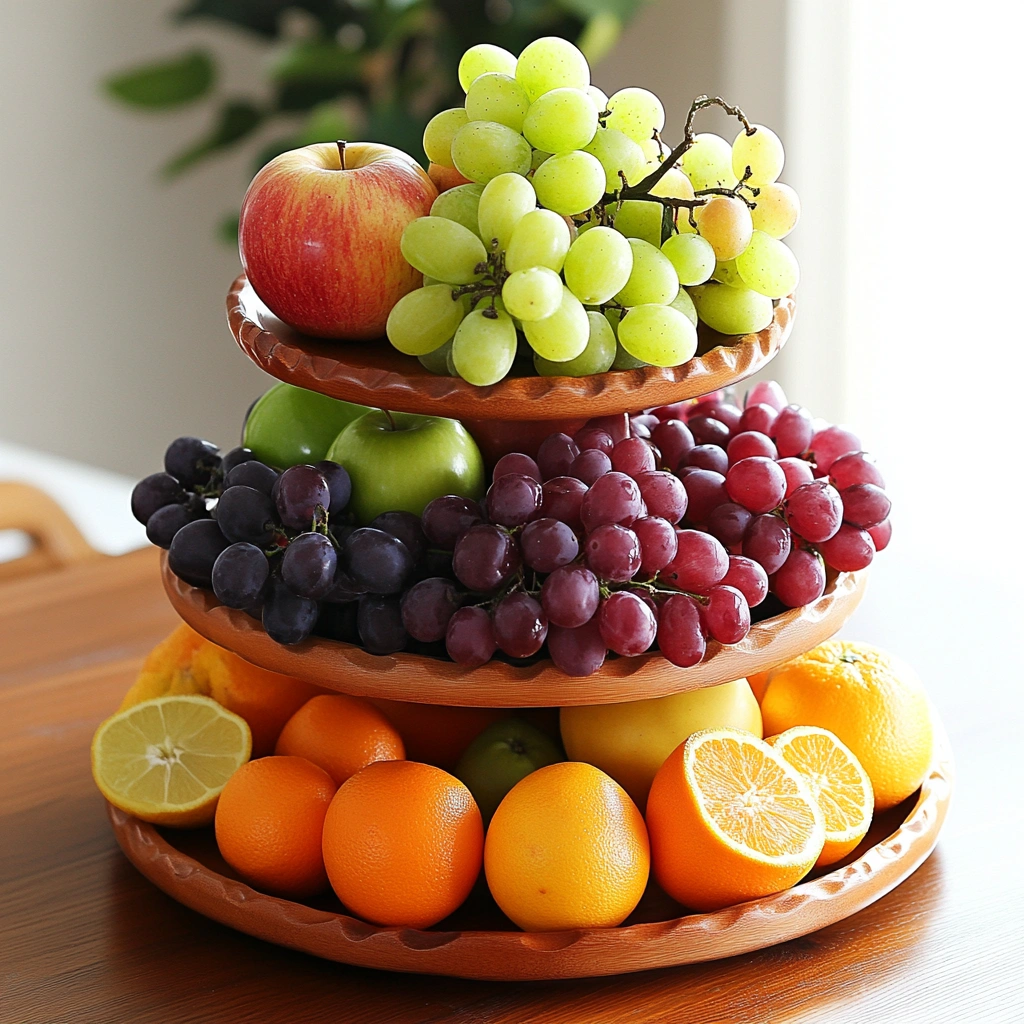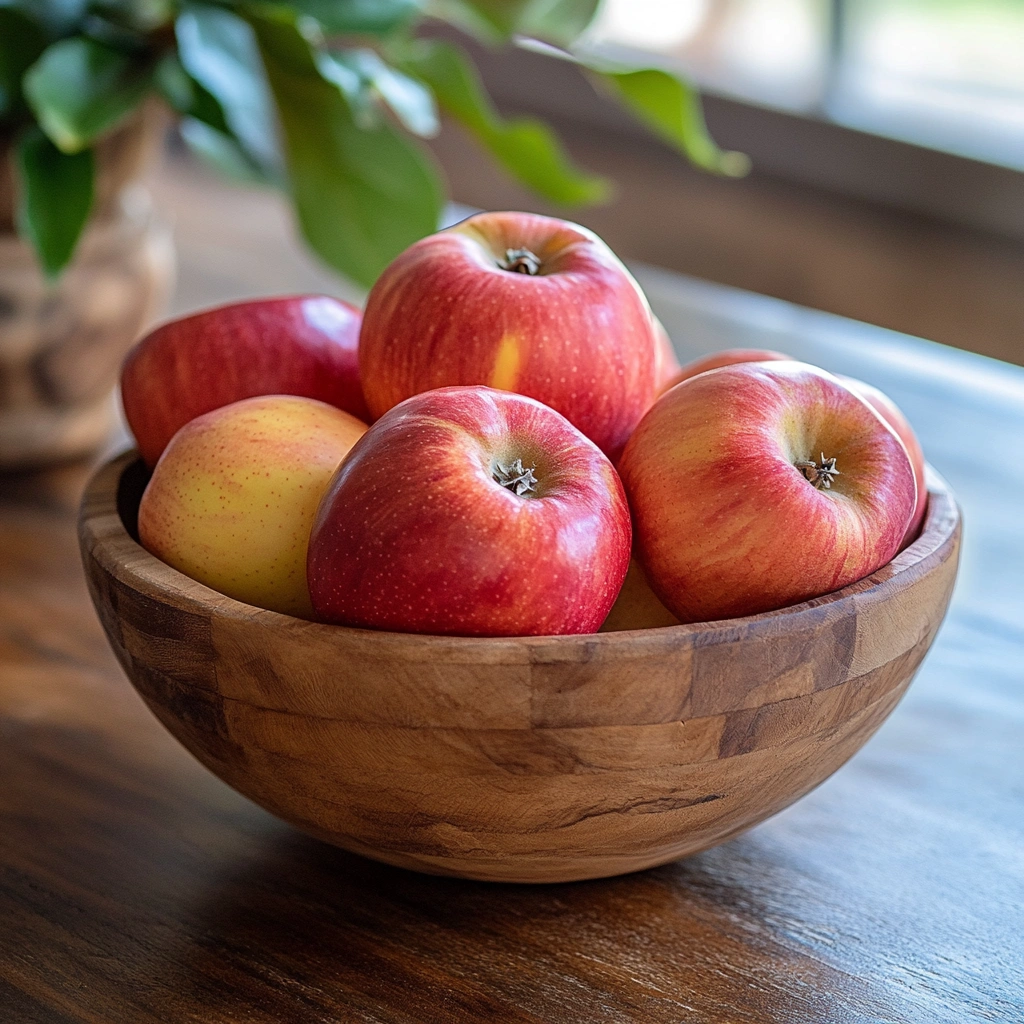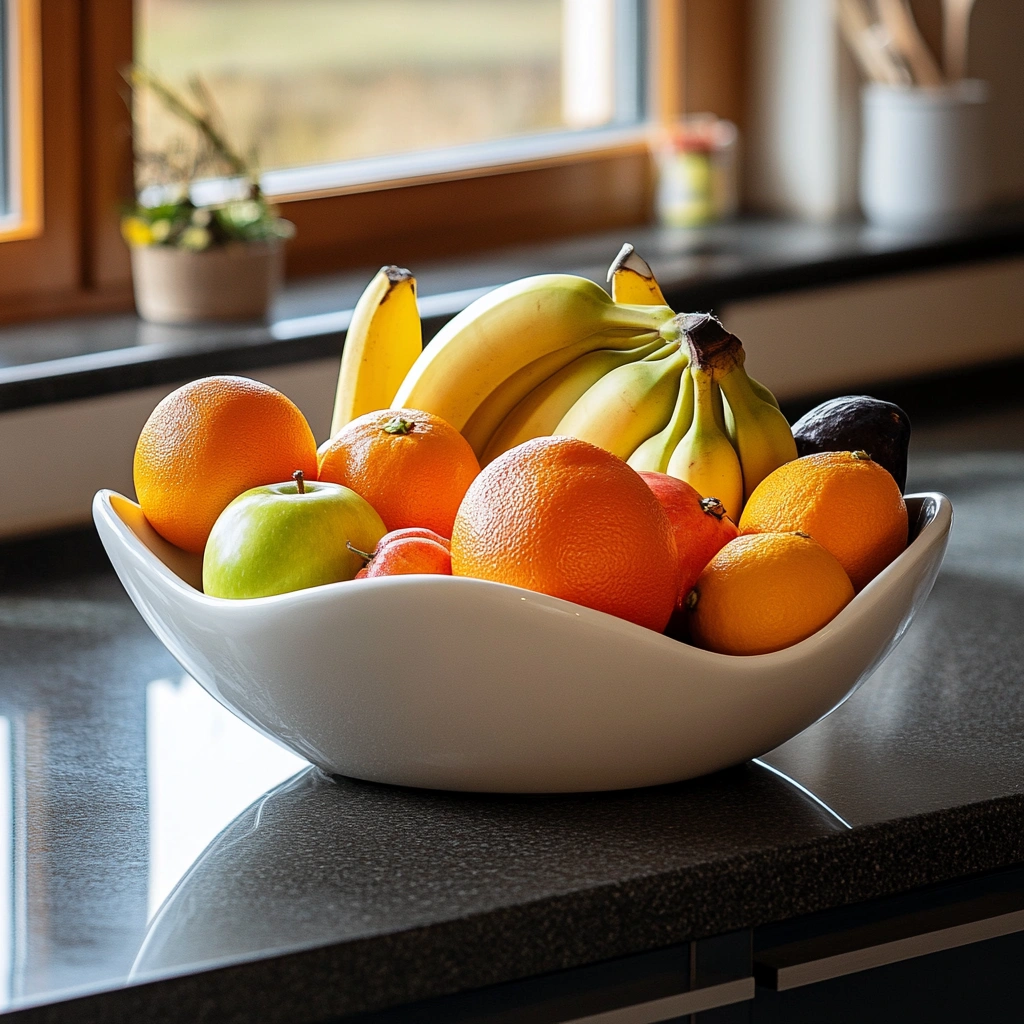Choosing the best bowl for fruit may seem simple, but it can significantly impact how long your fruit stays fresh and enhance your kitchen’s aesthetic. The right bowl can prevent fruit from rotting prematurely, keep it fresh for longer, and add a decorative element to your kitchen. Whether you’re storing apples, bananas, or citrus fruits, the right bowl can make all the difference. This guide will cover everything you need to know about selecting the best bowl for fruit — from materials and designs to practical tips for extending the freshness of your fruit.
Factors to Consider When Choosing a Fruit Bowl
When selecting a fruit bowl, it’s important to consider more than just how it looks. Key factors such as material, breathability, and design play a major role in keeping your fruit fresh for as long as possible. Let’s look at the most important considerations:
- Material: The material of the bowl affects airflow and moisture retention, which can determine how quickly fruit ripens.
- Durability: Some bowls are designed to last longer than others, depending on whether you want one that fits your everyday decor or seasonal changes.
- Breathability: Proper airflow is crucial to preventing ethylene gas build-up, which accelerates ripening and spoilage.
Now that you know the key factors, let’s dive deeper into the various types of materials used for fruit bowls and their specific benefits.
Ceramic Bowls: Timeless and Functional
Among the most popular options, ceramic bowls stand out for their durability, weight, and elegant designs. These bowls provide a great balance between airflow and moisture control, making them ideal for preserving fruit. Moreover, ceramic bowls help maintain a cooler temperature, which is beneficial for storing fruits like apples, pears, and citrus fruits, which don’t ripen well in warm conditions.
Another advantage is the ease with which ceramic bowls can be cleaned. Bowls like the Emile Henry French Ceramic Fruit Storage Bowl are popular for their beautiful designs and scratch-resistant qualities.
Advantages:
- Helps maintain a cool environment for fruit storage.
- Ideal for a wide variety of fruits.
- Easy to clean and maintain.
Disadvantages:
- Heavier than other options.
- Can break if dropped.
Wire-Mesh Bowls: Maximum Airflow

If you’re looking for a bowl that ensures maximum airflow, wire-mesh fruit bowls are an excellent option. These bowls promote air circulation, which prevents moisture build-up and reduces the likelihood of fruit rotting. This makes them particularly effective for fruits that produce ethylene gas, such as bananas and avocados.
Additionally, wire-mesh bowls are lightweight and easy to move, making them both practical and stylish. Their open design is perfect for showcasing colorful fruits like oranges, apples, and lemons.
You can check out Tasting Table’s guide for more information on how perforated designs improve fruit freshness.
Advantages:
- Promotes airflow and reduces moisture.
- Lightweight and easy to carry.
- Ideal for ethylene-producing fruits.
Disadvantages:
- Small fruits like berries can fall through the gaps.
- Wire can rust if not cleaned properly.
Glass Bowls: Aesthetic and Practical
Glass bowls are often chosen for their visual appeal and practicality. Their transparency not only makes them aesthetically pleasing, but it also serves as a handy reminder to consume the fruit before it spoils. Glass is a non-reactive material, meaning it won’t affect the taste or quality of the fruit inside.
These bowls are versatile and can be used for fruit storage or as serving bowls for fruit salads. However, avoid placing them in direct sunlight, as this can cause the fruit to ripen too quickly.
Explore stylish options on The Kitchn for glass fruit bowls.
Advantages:
- Transparent design allows easy fruit visibility.
- Non-reactive material ensures no flavor alteration.
- Suitable for both storage and serving.
Disadvantages:
- Fragile and prone to breaking.
- Can cause faster ripening in direct sunlight.
Wooden Bowls: Natural and Aesthetic

Wooden bowls, often made from materials like acacia or bamboo, are favored for their rustic and natural appeal. These bowls are eco-friendly and can add a touch of nature to your kitchen decor. However, wooden bowls are best suited for fruits that do not require excessive airflow, such as apples and pears.
Because wood absorbs moisture, it’s important to ensure the bowl is properly sealed. With the right care, wooden bowls can last for many years.
Advantages:
- Adds a rustic, natural aesthetic to your kitchen.
- Environmentally friendly material.
- Long-lasting when properly maintained.
Disadvantages:
- Requires regular maintenance to prevent mold or cracking.
- Not ideal for fruits that emit a lot of moisture.
Multi-Tiered Fruit Bowls: Save Space and Store More

For those with limited counter space, multi-tiered fruit bowls offer a space-saving solution. These bowls often come with two or three tiers, allowing you to store different fruits in separate sections. This is especially useful for fruits that should not be stored together, like bananas and apples, which can speed up each other’s ripening.
Tiered bowls are also visually appealing and can serve as a decorative centerpiece in your kitchen.
Advantages:
- Saves counter space.
- Allows for separation of fruit types.
- Visually appealing and functional.
Disadvantages:
- Can be difficult to clean.
- Not ideal for small kitchens with limited space.
Perforated and Ventilated Bowls: The Best for Airflow
If you often find that your fruit ripens too quickly, perforated or ventilated bowls may be the best option. These bowls have holes or slits that allow for maximum airflow, preventing moisture build-up and helping to slow down the ripening process.
These types of bowls are perfect for fruits like avocados, peaches, or tomatoes, which emit a lot of ethylene gas and can spoil quickly if kept in a closed or airtight bowl.
Advantages:
- Encourages airflow and prevents moisture build-up.
- Helps keep ethylene-producing fruits fresher for longer.
- Lightweight and easy to move.
Disadvantages:
- May not be ideal for small fruits.
- Prone to dust and debris accumulation.
Footed Bowls: Elevating Your Fruit Storage
Footed bowls, which lift the fruit off the surface, are designed to prevent fruit from sitting in its own juices. This helps reduce moisture accumulation at the bottom, which can lead to mold or spoilage. These bowls are particularly useful for fruits like grapes or peaches that may release juice as they ripen.
Footed bowls come in a variety of materials such as ceramic, glass, or wood, and can add an elegant touch to your kitchen.
Advantages:
- Prevents fruit from sitting in its own juice.
- Adds an elegant, elevated design to your kitchen.
- Suitable for a wide range of fruits.
Disadvantages:
- Limited storage capacity.
- May become unstable if overfilled.
Care and Maintenance of Fruit Bowls
Proper care of your fruit bowl is essential to keep your fruit fresh and your bowl in good condition. Different materials require different cleaning methods. Here’s a quick guide:
- Ceramic: Use mild soap and water. Avoid abrasive cleaners to prevent scratching the surface.
- Wire-Mesh: Wipe with a damp cloth and dry thoroughly to prevent rust.
- Glass: Clean with soap and water and avoid placing the bowl in direct sunlight.
- Wooden: Clean with a damp cloth and occasionally oil the bowl to prevent drying out or cracking.
Tips for Keeping Fruit Fresh
Choosing the right bowl is important, but there are additional steps you can take to extend the life of your fruit:
- Separate ethylene-producing fruits: Bananas, apples, and avocados emit ethylene gas, which speeds up ripening. Store them separately from other fruits.
- Avoid overcrowding: Leave space between each piece of fruit to allow for proper airflow.
- Keep the bowl out of direct sunlight: Sunlight accelerates ripening and can lead to quicker spoilage.
FAQs
What is the best material for a fruit bowl? The best material for a fruit bowl depends on the type of fruit you’re storing. Ceramic and glass bowls are excellent for keeping fruit cool, while wire-mesh and perforated bowls are ideal for fruits that need more airflow.
Can I mix different fruits in the same bowl? It’s generally not a good idea to mix fruits that produce a lot of ethylene gas (such as bananas) with other fruits. Doing so can cause the other fruits to ripen and spoil more quickly.
How do I prevent fruit from rotting in the bowl? Use a ventilated or wire-mesh bowl to promote better airflow, which helps prevent moisture build-up. Additionally, store the bowl in a cool, shaded area to slow down the ripening process.
How often should I clean my fruit bowl?
It’s recommended to clean your fruit bowl at least once a week, or immediately if you notice any fruit starting to spoil. Regular cleaning prevents bacteria, mold, and odors from accumulating in the bowl.
Should I refrigerate fruits or leave them in the bowl?
Some fruits, like apples and citrus, do well in a fruit bowl, while others, such as berries and grapes, should be refrigerated to stay fresh. Always check the recommended storage methods for each type of fruit.
Conclusion
Choosing the best bowl for fruit involves more than simply picking one that looks good. The right bowl, whether it’s ceramic, wire-mesh, glass, or wooden, can help keep your fruit fresher for longer by providing the ideal environment for ripening. By considering factors like material, airflow, and design, and following proper care tips, you’ll be able to preserve your fruit and maintain an aesthetically pleasing kitchen.


